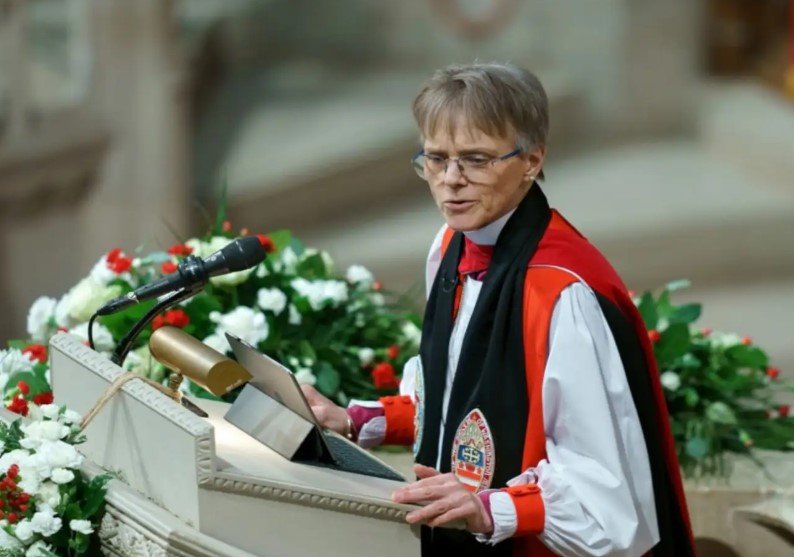Bishop Mariann Budde, the Episcopal Bishop of Washington, DC, is speaking out after her remarks during a National Prayer Service were publicly politicized, drawing sharp responses from former President Donald Trump. In her defense, Budde says she was simply expressing a message of compassion and truth, but it seems in today’s climate, even messages of mercy can become a battleground.
Budde’s remarks, aimed at fostering unity and calling for compassion for vulnerable communities, including immigrants and refugees, were met with backlash from Trump, who accused her of turning the service into a political statement. This sparked a debate on how figures of faith and influence navigate the hyper-political landscape of the moment.
Politicized Messages in Today’s Climate
Bishop Budde’s appeal during the National Prayer Service was simple and poignant: to pray for mercy on the vulnerable, particularly immigrant families. She called for unity among the American people, emphasizing that such unity must transcend political divisions. Yet, as the fallout from her words shows, it’s near impossible to make a non-partisan plea in an age of heightened political polarization.

Budde reflected on the reaction to her speech, noting that while she hoped for a message of unity and compassion, she understood how it could be misinterpreted. “We’re in a hyper-political climate,” she said, pointing to how easy it is for even the most well-meaning words to be hijacked by political agendas. Her message about mercy and unity was lost in the noise of partisan rhetoric, something that’s become all too familiar for public figures today.
“I was trying to speak a truth that I felt needed to be said but to do it in a respectful and kind way as I could,” Budde explained. But in an environment that thrives on division, that’s often easier said than done.
The politicization of her message was perhaps inevitable. In the current climate, it’s hard for anyone, especially public figures of faith, to make a statement without it being viewed through a political lens. Budde’s message, calling for empathy for marginalized groups, was swiftly framed as a critique of Trump’s immigration policies. Yet, she insists, that wasn’t her intention. “How could it not be politicized, right?” she said, acknowledging the inevitability of such reactions in today’s charged atmosphere.
The Trump Reaction: A Clash of Values
Trump’s reaction to Budde’s words was quick and sharp. In a post on Truth Social, the former president called Budde a “radical left hard-line Trump hater,” accusing her of turning the service into a political spectacle. He argued that her message failed to acknowledge the crime associated with illegal immigration, accusing her of disregarding the dangers posed by “illegal migrants” to the American people.
According to Trump, her tone was “nasty” and the content of her message was “not compelling or smart.” His response wasn’t just about the content of her speech—it was a direct attack on her role as a religious leader. In his eyes, she wasn’t performing her duties as a spiritual figure but rather aligning herself with political movements.
Despite his criticism, Budde stood firm, defending the integrity of her message. She pointed out that it was not about agreeing on political matters but about finding a shared humanity across political divides. It was a call to mercy in a time of fear, not a political statement designed to antagonize any one group.
Unity vs. Division: The Ongoing Struggle
At the heart of Budde’s address was a plea for unity that transcended partisan divides. “We gathered to pray for unity as a people and a nation—not for agreement, political or otherwise—but for the kind of unity that fosters community across diversity and division,” she said. In a nation that has been torn apart by political and cultural differences, the idea of unity feels increasingly distant. However, Budde believes it’s possible to build bridges even when the political landscape is at its most divided.
The sharp contrast between her message and Trump’s reaction highlights the divide that exists not only between politicians but also among the religious community. Her attempt to speak to a broader moral compass was quickly reframed into a political critique, a dynamic that plays out frequently in today’s media ecosystem.
A Wider Issue: The Role of Faith Leaders in Politics
Budde’s experience is far from isolated. Religious figures across the spectrum find themselves in the crossfire of politics, especially when their messages touch on social justice or political issues like immigration, race, or LGBTQ rights. The line between faith and politics is increasingly difficult to navigate, as religious leaders are often expected to take stances on these issues while also maintaining their spiritual integrity.
Bishop Budde’s comments reflect the broader struggle of balancing faith-based values with the demands of a politically charged environment. “The culture of contempt we live in right now immediately rushes to the worst possible interpretations,” she noted, adding that it’s easy to categorize people based on narrow political views rather than seeking to understand their message in full.
Her appeal for mercy may have been aimed at healing divisions, but it only deepened them, at least in the public eye. What should have been a call to compassion for the vulnerable has turned into yet another chapter in the ongoing saga of political division, where even the most compassionate of words are dissected and repurposed for partisan gain.
